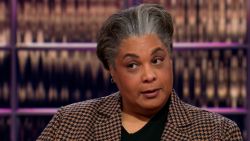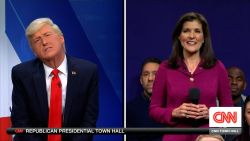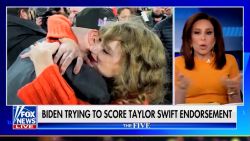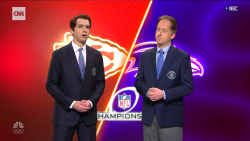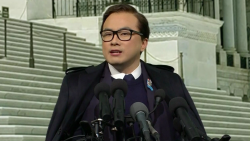The White House on Monday said that CNN correspondent Jim Acosta’s press pass has been “restored,” bowing to days of pressure and a federal lawsuit against the administration.
In response, CNN said in a court filing that it has dropped the ongoing litigation over Acosta’s access to the White House.
“Today the White House fully restored Jim Acosta’s press pass. As a result, our lawsuit is no longer necessary,” the network said in a statement. “We look forward to continuing to cover the White House.”
Monday afternoon’s announcement, what the White House called a “final determination,” was an abrupt shift from the administration’s earlier positions.
Nearly two weeks ago the Trump administration took the unprecedented step of suspending Acosta’s access to the White House after he had a contentious exchange with President Trump at a press conference.
When a federal judge sided with CNN and issued a temporary restraining order last Friday, thereby forcing the White House to restore his press pass for 14 days, the administration continued to threaten his access.
In a private letter to Acosta that same evening, two of the defendants in CNN’s suit – press secretary Sarah Sanders and deputy chief of staff for communications Bill Shine – cited Acosta’s conduct at the November 7 press conference, where he asked multiple follow-up questions and didn’t give up the microphone right away. “You failed to abide” by “basic, widely understood practices,” the letter to Acosta claimed.
Many journalists have challenged the administration’s actions, pointing out that aggressive questioning is a tradition that dates back decades. But Trump appeared eager to advance an argument about White House press corps “decorum,” no matter how hypocritical.
The letter from Shine and Sanders said their “preliminary decision” after the press conference was to suspend the press pass. This indicated that the White House could take further action against Acosta as soon as the judge’s temporary restraining order expired.
It was also a sign that the White House was trying to establish a paper trail. The judge in the case, Timothy J. Kelly, had criticized the government for not following due process before banning Acosta on November 7. His ruling in Acosta and CNN’s favor was on Fifth Amendment due process grounds.
So Friday night’s letter offered Acosta a chance to contest the decision and said a “final determination” would be made by Monday at 3 p.m.
Lawyers for Acosta and CNN did respond, forcefully, in a letter and in a court filing.
They had signaled a willingness to settle after prevailing in court on Friday. But in a new motion on Monday morning, they said the defendants “did not respond to this offer to cooperate.” Instead, the letter from Shine and Sanders was an “attempt to provide retroactive due process,” the filing alleged.
So CNN and Acosta asked the judge to set a schedule of deadlines for motions and hearings that would give the network the chance to win a preliminary injunction, a longer form of court-ordered protection to Acosta’s press pass.
They were seeking a hearing “for the week of November 26, 2018, or as soon thereafter as possible,” according to the court filing.
The judge had yet to file on that request when the Monday at 3 p.m. deadline came.
The new Monday afternoon letter from Sanders and Shine included no expiration date, though it did contain the general threat to take action against reporters who flouts new “rules.”
The White House’s letter said, “Having received a formal reply from your counsel to our letter of November 16, we have made a final determination in this process: your hard pass is restored. Should you refuse to follow these rules in the future, we will take action in accordance with the rules set forth above. The President is aware of this decision and concurs.”
The White House press corps, however, has not agreed to any new set of rules governing presidential press conferences. And Trump rarely holds press conferences anyway.
The White House Correspondents’ Association said Monday it had “no role in crafting” what the White House sent out.
The letter asserts that reporters may ask “a single question” at a press conference. Follow-ups will only be permitted “at the discretion of the President or other White House officials.” And reporters must “physically surrender” the microphone, when directed.
In practice, many reporters asked follow-up questions at the November 7 press conference.
And that’s not going to change any time soon. “For as long as there have been White House press conferences, White House reporters have asked follow-up questions. We fully expect this tradition will continue,” the association said.
It remains to be seen if the rules are just cover for the administration’s loss to CNN in court. At the same time, the White House’s move could create a chilling effect among reporters.
Tensions remain high, with the White House rarely holding press briefings and Trump regularly lashing out at the media. Some observers wondered if he picked the fight with CNN and Acosta to distract the media from the Democrats’ gains in the midterm elections.
Trump seemed to shrug off last week’s loss in court, telling Fox’s Chris Wallace in an interview that “it’s not a big deal.”
He said in the interview that the White House would “create rules and regulations for conduct” so that the administration can revoke press passes in the future.
“If he misbehaves,” Trump said, apparently referring to Acosta, “we’ll throw him out or we’ll stop the news conference.”
Acosta, for his part, thanked his supporters on Monday. “Lets get back to work,” he tweeted.




